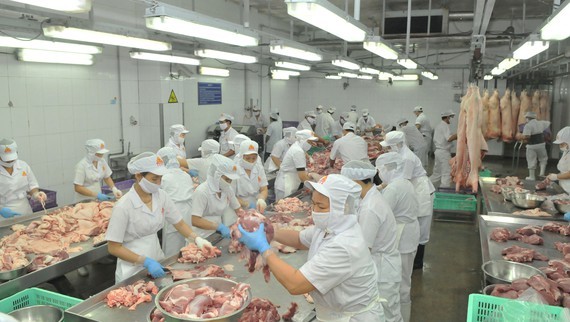
At the end of the peak business period in March and April, Mr. Phan Van Dung, Deputy General Director of Vissan Joint Stock Company, said that sales of processed foods increased by 30-40 percent, especially canned foods increased by more than 50 percent over the same period last year. However, the group of fresh food products decreased by 15-20 percent for many reasons. Of which, the main reason is that the domestic supply of raw materials has not met the demand, increasing the cost prices of products, making the purchasing power shrink.
Similarly, many food and foodstuff producers also posted quite good growth in revenue thanks to rocketing demand and purchasing power from the domestic market during the pandemic. Many city-based enterprises, such as Vinh Phat Company that specializes in providing rice, and Vifon that produces instant foods, including noodles, pho, and rice noodles, had adjusted their business strategies, gathering up their resources for the domestic market instead of for export like before. In other words, if the pandemic caused several enterprises in other fields to cease operations, or even go bankrupt, for some enterprises, this was an opportunity for them to restructure and diversify products.
According to Mr. Phan Van Dung, during the Covid-19 pandemic, Vissan determined that it would need to prepare resources for the second peak shopping period. However, in reality, the demand doubled during the peak shopping period for the Tet holidays. Having determined that the disease would only occur in a short time, the company did not choose the laid-off option but restructuring its workforce, arranging employees from one department to another department to meet the rising demand of the market.
Besides, the outbreak was also the time for it to develop more new distribution channels. The company had converted its 55 showrooms into 55 hubs and warehouses. Although it has not deployed online selling, these stores have applied selling over the phone and through its fan page on Facebook. When customers call to its hotline, goods will be delivered to their houses from hubs within two hours. From April 25, the company officially opened an online store on Sendo, one of large and prestigious e-commerce platforms in Vietnam.
Mr. Phan Van Dung said that since the outbreak of the Covid-19, Vissan seemed to forget completely the export sector but concentrated all its resources on researching and production to diversify products to best meet the demand of domestic consumers. This can be explained that the processed food sector achieved extremely good growth right after the peak business season of the Lunar New Year.
According to Ms. Ly Kim Chi, Chairman of Food and Foodstuff Association of Ho Chi Minh City, in the difficult situation caused by the Covid-19 pandemic, foods producers have had very good ideas, spreading their enthusiasm to other enterprises, encouraging them to start researching on bringing new materials into production in an attempt to help Vietnam to stand firmly while adding value to local agriculture. For example, ABC Bakery chain stores have used more than 30 tons of dragon fruits to produce dragon fruit bread. Based on this idea, many enterprises have developed more new products such as vermicelli, pho, and other products using new materials such as durian, watermelon, and soursop.
Nevertheless, to create the momentum for enterprises to continue to develop after the pandemic, especially to make good use of available domestic materials, it is necessary to have additional mechanisms and policies to support enterprises. According to Ms. Chi, the Government’s VND300-trillion credit package for enterprises affected by the Covid-19 pandemic has been implemented and some enterprises have accessed financial support but the number of helped-enterprises is not commensurate with the actual situation. Currently, many enterprises are in a difficult situation but have not been able to access this support package. The food and foodstuff processing sector needs to absorb capital to increase production. Meanwhile, due to the pandemic, their customers want to defer payment while farmers and suppliers want to get their money immediately; banks are struggling to implement new policies.
The pandemic has urged many enterprises to start adjusting their business strategies to suit the actual situation. They have turned "the risk into the opportunity" by increasing quality, design, and reducing prices to improve the competitiveness of goods. However, besides the activeness of enterprises, it is necessary to have the drastic participation of all levels and sectors to create conditions for enterprises to expand the market right in the domestic market, all towards the goal of making the domestic market become the leverage for economic growth. This is also a solid foundation to help enterprises to reach international markets when the Covid-19 pandemic passed.
Besides, the city has a mechanism to attract investors to develop cold storage, contributing to increasing the value of goods, creating a link for agricultural households, and small and medium-sized enterprises. At this time, it is necessary to promote the campaign "Vietnamese people prioritize using Vietnamese goods", creating a link between businesses and provinces to support the consumption of goods. For goods that are facing a shortage of supply, such as pork, the government should have policies to support firms and farmers to accelerate pig repopulation, and implement well the epidemiological control as a basis to stabilize the market and the price from now until the end of the year.
























